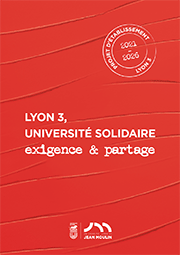AccueilRechercheProgrammes et productions scientifiquesThèsesThèses soutenuesThèses soutenues - 2006-2021Thèses soutenues - 2010
-
Partager cette page
- Recherche,
TRICOT épouse GUERIN Marie
Le rôle des facteurs affectifs dans le processus de détérioration du lien relationnel en situation de crise
Thèse en Sciences de gestion Soutenue le 3 Mai 2010
La situation de crise est, dans un contexte alimentaire, source de nombreux changements de comportement d'achat/consommation. A cet égard, les différents travaux établis jusqu'alors allouent une place centrale au concept de risque perçu dans l'explication de tels phénomènes.
L'importance croissante accordée aux états affectifs dans l'explication de certains comportements du consommateur souligne aujourd'hui l'intérêt d'élargir cette approche. Cette recherche propose ainsi d'appréhender les différents changements de comportement d'achat/consommation comme la résultante d'un processus de détérioration du lien relationnel initialement établi entre les acteurs du secteur et les consommateurs. Celui-ci trouve son origine dans l'apparition d'un événement (rappel ou retrait de produit, accident, intoxication alimentaire, empoisonnement, malversations, etc.) perçu comme suffisamment inhabituel et préoccupant pour attirer l'attention d'un certain nombre d'individus et déclencher chez eux, diverses réactions d'ordre affectif et cognitif. Agissant de concert, ces réactions suscitent la remise en question de la confiance initialement accordée aux acteurs du secteur alimentaire. Le désengagement dans la relation se manifeste finalement au travers d'arrêts temporaires ou définitifs d'achat/consommation, ou par une recherche d'informations accrue, une substitution de produits ou de sources d'approvisionnement, mais encore par le développement d'un bouche-à-oreille négatif ou d'actions de boycott.
L'objectif de ce travail de recherche consiste à montrer que la prise en compte des réactions affectives induites par la situation de crise améliore la compréhension du processus de détérioration de la relation consommateurs-acteurs du secteur alimentaire. Cette démonstration a nécessité la construction d'un nouveau concept, « l'affect de crise » défini comme « un concept subjectif et relatif résultant des réactions de colère, d'anxiété et de surprise induites par la situation de crise chez les consommateurs.», et de son échelle de mesure.
Les résultats obtenus mettent clairement en exergue l'amélioration induite par la prise en compte de ce concept dans l'explication de la perte de confiance et des changements de comportement d'achat/consommation.
Mots-clés :
crise, affect de crise, incertitude alimentaire perçue, perte de confiance, changements de comportement d'achat/consommation.
The crisis situation, regarding food, leads to numerous changes in buying and consuming behaviour. In this respect, the various works that have been carried out so far give a central position to the concept of perceived risk in the explanation of such phenomena.
The growing importance lent to emotional states in the explanation of some of the consumer's attitudes underlines today the necessity to widen this approach.
This research thus offers to understand the different changes in the buying/consuming behaviour as the outcome of a deterioration process of the link initially established between the protagonists of the sector and the consumer. This process originates from the appearance of an event (in case of a product recall, or an accident, a food poisoning, or malpractice) that is unusual and worrying enough to craw the attention of some individuals who, therefore, develop various emotional and cognitive reactions. These reactions simultaneously lead to question the confidence initially put in the protagonists of the food sector.
Withdrawing from the relationship eventually leads individuals to stop buying/consuming temporarily or permanently, to look for detailed information, or to change products or supplying sources, and also to spread negative rumours or taken boycott actions.
The purpose of this research work consists in showing that taking into account the emotional reactions resulting from the crisis situation leads to a better understanding of the deterioration process in the relation between the consumers and protagonists of the food sector.
This demonstration required the implementation of a new concept, the crisis affect, defined as a subjective and relative concept aiming at synthesizing all the emotional reactions which are the most commonly and collectively felt by the consumers who are confronted with a crisis situation, and of its scale.
The results that are obtained clearly underline the improvement that results from taking into account this concept in the explanation of the loss of confidence and of the changes in buying/consuming behaviour.
Keywords:
crisis, crisis affect, uncertainty regarding food, loss of confidence, changes in buying/consuming behaviour.
Directeur de thèse : Yves NEGRO
Membres du jury :
Jean-François LEMOINE, Professeur, Université Paris 1 Panthéon Sorbonne
Pierre VALETTE-FLORENCE, Professeur, Université P. M. France Grenoble 2
Yves NEGRO, Professeur, Université Jean Moulin Lyon 3
Sylvain BIARDEAU, Professeur, Université Jean Moulin Lyon 3
Jean-Jack CEGARRA, Professeur, Université Jean Moulin Lyon 3
Georges GIRAUD, Professeur HDR, Vet Agro Sup (ENITA Clermont)
Mention : Très honorable avec les félicitations du jury
Equipe d'accueil : MAGELLAN







